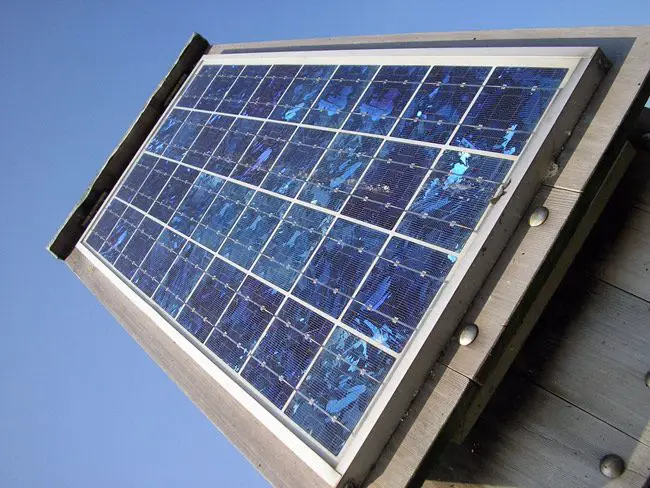
Backers and opponents of a solar-energy proposal on the November ballot aren’t making predictions after a separate alternative-energy measure was overwhelmingly approved by voters Tuesday.
Instead of comparing the two measures, the group Consumers for Smart Solar said its “sole focus” is advancing the November ballot proposal. The proposal, known as Amendment 1, is backed by the utility industry and would primarily put into the state Constitution existing rules on the use of solar energy in Florida.
“Amendment 1 gives Florida an historic opportunity to advance solar energy while protecting consumers, both those who choose solar and those who do not,” Jim Kallinger, a former Republican lawmaker who is co-chairman of Consumers for Smart Solar, said in a prepared statement after being asked if there was anything to be learned from Tuesday’s vote. “We are committed to running a strong campaign to reach every voter going into November and are gratified by recent polling that shows overwhelming support for Amendment 1.”
The measure approved Tuesday was put on the primary ballot by the Legislature and received nearly 73 percent of the vote. Known as Amendment 4, it was backed by business and environmental groups.
But the November proposal has been more controversial, drawing opposition from groups such as the Southern Alliance for Clean Energy that argue the measure is intended to benefit utilities.
Stephen Smith, executive director of the Southern Alliance for Clean Energy, wouldn’t make comparisons between Tuesday’s results and how a larger number of voters will swing in November when they go to the polls for the presidential race.
“We have been very careful over the last few months because the confusion over the two ballots could be pretty intense,” said Smith, whose group supported Tuesday’s amendment. “Even though we were talking about ‘no on (Amendment) 1 in November,’ we had not been able to focus on that.”
Smith said that has now changed.
After being approved Tuesday, Amendment 4 is expected to exempt for 20 years the assessed value of solar and renewable-energy devices installed on businesses and industrial properties. Voters approved a similar exemption for residential property owners in 2008, with the measure taking effect in 2014.
Amendment 4, which state lawmakers must still enact into law, also has an element to help residential property owners, as it would exempt all renewable-energy equipment from state tangible personal property taxes.
The Consumers for Smart Solar proposal, meanwhile, would allow “individuals and businesses to own and lease solar equipment to generate their own electricity while providing specific legal authorization for the leasing of solar equipment — a practice that occurs now but is not yet specifically authorized in Florida.”
Supporters of Amendment 1 have already spent more than $15.8 million, with much of the money coming from Florida Power & Light, Duke Energy, Tampa Electric Co. and Gulf Power.
In June, the Saint Leo University Polling Institute found 68.2 percent support statewide for the amendment approved Tuesday. In that same survey, support for Amendment 1 on the November ballot was at 77.3 percent, with just 6.8 percent opposed and 15.9 percent unsure.
Constitutional amendments need support from 60 percent of voters to pass.
–Jim Turner, News Service of Florida





























George chambers says
Scam. The bills in essence are a trick which is why the power company’s are backing it. Solar energy has been tied up by power companies thru pattens on the same long ago which is why there has been no advancement in the commodity. Basically why you can’t buy a car that gets 200 miles to the gallon. Not because we don’t have the technology but because the research and ultimate marketing is controlled by the oil industry. Same thing here.
IMO says
As far as I know from my own reading on the subject the life span of a solar panel is 10 years.
So anyone who wants to invest $40,000 to $80,000 for solar panels for their home and then have to replace them every 10 years be my guest.
The best advice I ever heard from a Florida Solar Panel Company was start small and stay small Just do one or two major electrical usage appliance at a time. They recommend you start with your pool filter at first. Then mabe you A/C unit. But never do the entire house.
Then stop.
IMO says
By the way the energy analysis of the Clean Power Research center states it takes a Florida homewoner 16 years for a solar panel installation to pay for itself. But since the life span of a spolar panel is only 10 years you would nevr get there.
Solar power will only be cost effective when the money saved on electirec bills is more than the cost of the loan one needs to install the systems. The Sun may be “Free” but the Banks charge interest on long term loans.
IMO says
https://cleantechnica.com/2014/02/04/current-cost-solar-panels/
Sherry says
Interesting. . . my research shows that many solar panels are guaranteed for 25-30 years and that some have provided energy for over 30 years and are still at over 80% capacity:
According to a study undertaken by the National Renewable Energy Laboratory (NREL) a few years ago, which looked at the ‘photovoltaic degradation’ rates of some 2000 solar installations, the average solar panel loses about half of a percentage point (0.5%) of efficiency per year, which means that a panel at the end of its 25-year warranty period should still be operating at about 88% of its original capacity. However, not every panel will see degradation rates as high as 0.5%, as shown by this 30+ year old solar panel, which outperforms its original specs, even after decades in the sun.